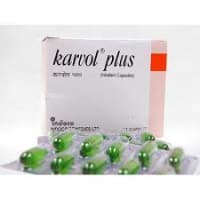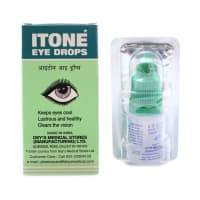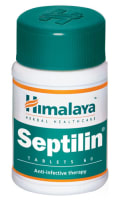USED FOR:
Nasal congestion (blocked nose)
Bradycardia
Pupil dilation
COMPOSITION:
Phenylephrine (5%)
Atropine (1%)
Therapeutic Uses:
ophthal

No interaction found

WEIGH RISKS VS BENEFITS
Sunephrine H Eye Drop may be unsafe to use during pregnancy.Animal studies have shown adverse effects on the foetus, however, there are limited human studies. The benefits from use in pregnant women may be acceptable despite the risk. Please consult your doctor.

Sunephrine H Eye Drop is probably safe to use during lactation. Limited human data suggests that the drug does not represent a significant risk to the baby.

Sunephrine H Eye Drop may make you feel dizzy, drowsy or affect your vision. Do not drive until your vision is clear.

CAUTION
Sunephrine H Eye Drop should be used with caution in patients with kidney disease. Dose adjustment of Sunephrine H Eye Drop may be needed. Please consult your doctor.

CAUTION
Sunephrine H Eye Drop should be used with caution in patients with liver disease. Dose adjustment of Sunephrine H Eye Drop may be needed. Please consult your doctor.
Uses of Phenylephrine
Phenylephrine is used in nasal congestion and pupil dilation.It is also used to treat low blood pressure that can occur during different types of anesthesia.
How to use Phenylephrine
This medicine is for external use only.Take it in the dose and duration as advised by your doctor. Check the label for directions before use. Hold the dropper close to the eye/ear without touching it. Gently squeeze the dropper and place the medicine inside the lower eyelid or ear. Wipe off extra liquid.
How Sunephrine H Eye Drop works
Phenylephrine is a nasal decongestant. It narrows the small blood vessels, which provide temporary relief from congestion or stuffiness in the nose.
Common Nausea, Vomiting, Headache, Palpitations, Increased blood pressure, Increased heart rate, Heart beat irregular.
Expert advice for Phenylephrine
Oral phenylephrine should be taken with food
Phenylephrine can make you restless, so don't take it too close to bedtime
Do not use this medicine without doctor's advice if you are pregnant or breast feeding
Smoking may worsen the effect; therefore use of tobacco should be avoided.
Q. Is Phenylephrine an antibiotic/a stimulant/an NSAID/ does Phenylephrine work/ does Phenylephrine makes your nose run/ does Phenylephrine has aspirin in it?
Phenylephrine is not an antibiotic, stimulant, NSAID, but a decongestant and is used to relieve blocked nose. Phenylephrine works for most of the patients if taken as recommended. It does not have aspirin in it
Q. Can i take phenylephrine with ibuprofen/pseudoephedrine/citalopram/Nyquil/ acetaminophen/ dextromethorphan/ Zyrtec/ Flonase/ Advil?
Drug interaction with any of the above mentioned drugs is not documented, but it can occur. Always follow your doctor’s advice before taking any medicine with phenylephrine
Q. Can i take Phenylephrine with high blood pressure?
Do not take Phenylephrine with high blood pressure
Q. Is Phenylephrine the same as Sudafed?
No, Phenylephrine is not same as Sudafed which contains pseudoephedrine.
Uses of Atropine
Atropine is used in the treatment of bradycardia.
How to use Atropine
This medicine is for external use only.Take it in the dose and duration as advised by your doctor. Check the label for directions before use. Hold the dropper close to the eye/ear without touching it. Gently squeeze the dropper and place the medicine inside the lower eyelid or ear. Wipe off extra liquid.
How Sunephrine H Eye Drop works
Atropine belongs to class of medication called as anticholinergic drugs. It acts by blocking the activity chemicals (acetylcholine) in the body, thereby producing effects such as reduction of salivary and other body secretions, relief of abdominal pain due to cramps, increase in the heart rate, and widening of the pupil..
Common Dryness in mouth, Excessive thirst, Palpitations, Increased heart rate, Arrhythmia, Reduced bronchial secretions, Dry skin, Slow heart rate, Photophobia, Dilatation of pupil, Flushing (sense of warmth in the face, ears, neck and trunk), Difficulty in urination, Constipation, Loss of accommodation.
Expert advice for Atropine
Do not start or continue atropine, in any form if you are allergic to atropine or any other ingredients of the medicine.
Do not start or continue atropine eye drops if you wear soft contact lenses; if you have increased pressure in the eyes (glaucoma); fever or increased heart rate.
Do not start or continue atropine tablets if you have a condition called pyloric stenosis characterize with difficulty for food to move from stomach into the small intestine causing pain or vomiting; or acid reflux with heartburn (gastro-oesophageal reflux) and diarrhea.
Avoid taking atropine if you have urinary retention, high blood pressure, any heart problem including weak heart, or high thyroid hormone level.
Do not take this drug if you have rare hereditary problems of intolerance to done or more types of sugar (including galactose intolerance, the Lapp lactase deficiency or glucose-galactose malabsorption.)
Do not drink alcohol while taking atropine in any form.
Atropine can cause visual disturbances, giddiness and staggering and, therefore, caution has to be taken before operating an automobile or machinery or engaging in activities requiring mental alertness and coordination.
Q. Is atropine a controlled substance?
No, it is available as prescription drug
Q. Is atropine a beta blocker /calcium channelblocker/adrenaline/ parasympathomimetic/vasopressor?
No, atropine belongs to class of medication called as anticholinergics or cholinergic antagonist
Q. Is atropine an agonist or antagonist?
Atropine is an antagonist of cholinergic receptors
Q. Is atropine a narcotic drug?
No, it is not a narcotic. However, it is often available in combination with drugs that have abuse potential
Q. Does atropine increase blood pressure/decrease heart rate/sedation/urinary retention/increase contractility?
Atropine decreases heart rate and increases blood pressure; It causes urinary retention as well as decreased contractility of gut and urinary bladder muscles. It does not cause sedation, on the contrary, it causes excitation, sleeplessness and agitation
Q. Does atropine cross placenta?
Yes, small amount of atropine can cause placenta. Always follow your doctor’s advice regarding its use
Q. Does atropine block activity of acetylcholine /nicotinic receptor?
Yes, atropine acts by inhibiting the activity of acetylcholine on muscarinic and nicotinic receptors.


 Sunephrine H Eye Drop
Sunephrine H Eye Drop  Bookmark
Bookmark





















